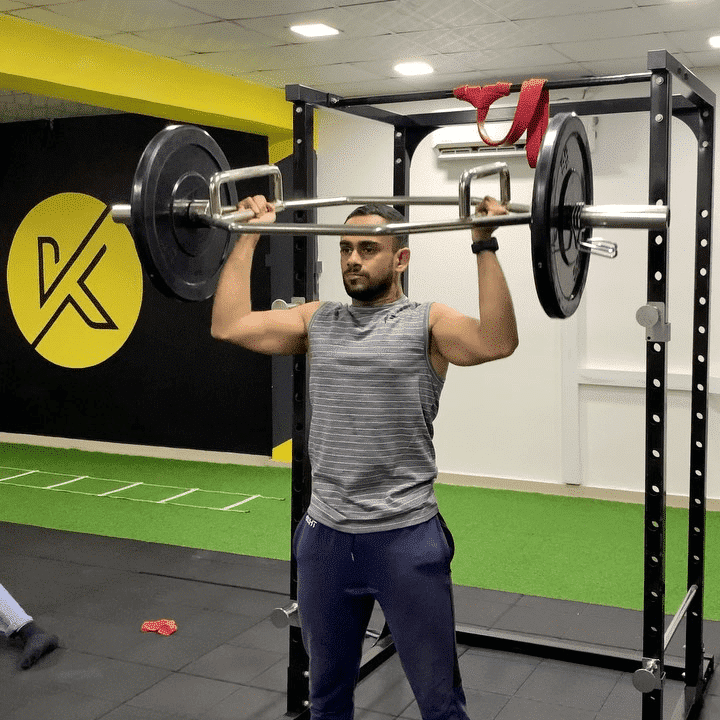It frustrates me when I see the trap bar is only used for the trap bar deadlift. The trap bar is an incredibly versatile piece of equipment that can be used to challenge your upper body as well. In particular, the trap bar overhead press is a great addition for those looking to overhead press while limiting stress on their shoulders and other joints. In this guide, we will break down how to do the trap bar overhead press with proper form and discuss all the benefits of the underutilized exercise.
Table of contents
Do I Need To Do Overhead Presses?
No, you technically do not need to do any exercise. But I would argue that you are heavily missing out if you are not doing any kind of overhead pressing whether that be caused by injury or laziness.

A common argument made by those who argue against overhead presses is that the delts already get enough work in if you are bench pressing. Sure, the delts are worked hard during flat benches but this does not mean you should leave gains on the table by neglecting your overhead work.
It has been proven time and time again that nothing triggers hypertrophy in your delts quite like in the overhead press. Aside from the studies, I can speak from experience when I tell you that my delts blew up like never before when I started getting really strong at pushing weight over my head.
If you are limited in this respect, this is understandable. Shoulder pain can be very hard to deal with, but the trap bar may allow you to press weight again if you give it a try.
Trap Bar Overhead Press Benefits
If you are one of those people that suffer from shoulder pain or are simply looking for another great exercise for your chest, the trap bar overhead press has a number of amazing benefits:
Saves Your Shoulders
The trap bar forces your arms to tuck in next to your body which is a much safer position for the shoulders. Not only that, the variety of grip options means that you can find the grips that feel the best for your individual build.
Given how common shoulder injuries are among the lifting community, you want to do everything in your power to protect your shoulders.

Wrists Are Secured
One of the most common technical mistakes during the overhead press is allowing the wrists to collapse backward. Not only will this make it harder to lift the weight but it can also lead to wrist pain over time.
With a trap bar, your wrists are locked into position and stacked directly over the elbows during the lift. This stable position minimizes the risk of a wrist injury even during more wrist-heavy variations like close-grip overhead presses.
Targets Delts Pain-Free
As we have already established, the shoulder press works your shoulder joint like no other exercise really can. Considering how crucial the delts are for acquiring a strong, masculine look you need to be overhead pressing in some way.
The trap bar allows you to target your delts without the shoulder pain that may plague your workouts currently.
Stronger Triceps
Since your elbows will be tucked in close to your body during the movement, your triceps are going to be more heavily engaged. Use of the trap bar can therefore lead to stronger triceps and better lockout strength across all pressing motions.
More Variation
With enough time, anyone will experience a plateau on the straight bar overhead press. With a trap bar, you get another variation that you can add to your rotation so that you avoid stalls in progress.
The slight change in form and muscle recruitment provided by the trap bar is enough to stimulate new muscle growth and help you push through plateaus.
Inexpensive
Compared to other specialty bars, the trap bar is fairly cheap. You can easily pick one up for under $300 from a quality brand. Given how versatile these bars are, I consider them no-brainers for home gyms.

Find The Best Trap Bar
After years of testing, we assembled a master list with the best trap bars for every home gym owner
How To Do The Trap Bar Overhead Press
Video Guide
Set the bar and rack up
Get into a shoulder press position
Unrack the bar
Press the bar up
Lower the weight
The exercise may feel foreign or weird at first, but that is normal. As you get more reps, you will better develop the form and mind-muscle connection.
Trap Bar vs Straight Bar Overhead Press
There are a few key differences between the trap and straight bar variations:
You Will Be Weaker With A Trap Bar
Do not expect to lift as much with a hex bar as you can with a regular barbell. This is because more of the load is taken off your pec and shoulder and placed on the tricep. Your tricep will not be able to produce the same amount of force so you will lift less. Also be aware that since the bar is so much large and wider, your stabilization muscles will have to work harder to keep the bar balanced.
This is not really a bad thing as it allows you to get more out of less weight. As long as you are training hard, you should still see delt gains and direct strength carryover to straight bar presses.
You should also be aware that trap bars can vary a lot in weight and size. Therefore you will have to account for that as they likely do not weigh the same as an Olympic barbell.

More Tricep Activation
As we have already discussed, the tucked elbows mean that more of the weight is placed on your triceps. This is exactly what you want if you are trying to address muscular imbalances or improve lockout strength.
Less Pain
For the vast majority of people, the trap bar will provide some relief if they suffer from wrist or shoulder pain.
Why Not Just Use A Swiss Bar or Dumbells?
If you have a swiss bar, then of course use it to do a neutral grip overhead pressing. The Swiss bar is more stable and has more grip options. The only real upside that the trap bar has in this regard is that you do not have to move your head out of the way for the bar. The other thing to consider is that in commercial gyms and home gyms alike, the trap is way more common and versatile. The majority of you reading this already have access to a trap bar in some way, the same cannot be said for a swiss bar.

As far as dumbbells go, the same thing applies to home gym owners. Dumbells are great because you can control the exact angle of your shoulder and elbow when pressing. However, dumbbell sets can be very expensive. Meanwhile, trap bars are fairly affordable and already in many home gyms.
Other Trap Bar Exercises
Another point that I want to drive home, especially for home gym owners, is to not be afraid to try out different movements that perhaps are not conventional. The trap bar has many benefits, the main one being versatility. Whether it be to keep things fresh or to get more out of your equipment, try some of these other underutilized trap bar exercises:
Trap Bar Squat (If you have an open trap bar)
Final Thoughts
The trap bar overhead press is a great way to grow your shoulders even if you struggle with shoulder pain. Even if shoulder pain is not a limiting factor, neutral grip bench pressing is a great variation that can complement and provide direct carryover to your regular bench press. The trap bar has become so readily available at commercial gyms and affordable for home gyms, that you might as well use it in as many ways as you can.

Find The Best Trap Bar
After years of testing, we assembled a master list with the best trap bars for every home gym owner
FAQs
Which bar to use for OHP?
Michael Kirkland, is a trusted fitness expert and founder of FitDominium. With his extensive experience and commitment to helping others, Michael is the go-to source for reliable fitness advice and recommendations.
